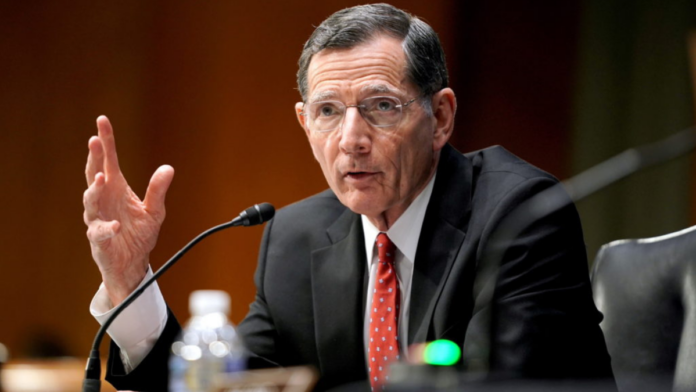

Photo credit: U.S. Sen. John Barrasso
The United States-Mexico-Canada Agreement (USMCA) sailed through the Senate Environment and Public Works committee on Tuesday, passing 16-4, despite criticism from Democrats who said the proposed agreement did not do enough to address climate issues.
Proponents of the bill argued it ensures trading partners also adopt strong environmental protections, while also opening new markets to American energy.
“USMCA builds on the certainty and progress achieved through recent trade agreements with Japan and China.
It is going to expand market access for a host of U.S. products, and it will sharpen U.S. exporters’ competitive edge,” said committee chairman Sen. John Barrasso (R, Wyo.).
“USMCA is an important opportunity for the United States to gain more jobs, incentivize more economic growth, and create more opportunity for the people of Colorado.
This agreement will continue to boost Colorado’s already vibrant trade relationship with our two largest global trading partners, Mexico and Canada,” said U.S. Sen. Cory Gardner (R-Colo.). “Without a free trading relationship between the U.S., Mexico, and Canada, Colorado’s agriculture community would suffer, leaving dairy farmers in Northern Colorado, wheat farmers on the Eastern Plains, cattle ranchers on the Western Slope, and potato farmers in the San Luis Valley, among others, without major marketplaces for their exports.
We have to give all of our Colorado exporters the best chance to access markets around the world and USMCA is a welcome modern agreement that helps us retain that access in North America.”
His sentiments were shared by western business leaders, who stressed that trade with Canada and Mexico provides an economic boon to the U.S.
“Trade with Canada and Mexico supports 12 million American jobs, and we’re one step closer to its passage in the U.S. Senate with the Senate Committee on Environment and Public Works voting to advance the legislation yesterday,” Debbie Brown, president of the Colorado Business Roundtable, told Western Wire.
“This agreement strengthens North American trade for American workers, farmers, businesses, and consumers, and we look forward to celebrating its passage.”
Canada and Mexico are important export markets for American fuels. According to statistics from the American Petroleum Institute (API), Mexico is the No. 1 market for American gasoline, fuel oil, and refined products, while Canada is the top market for exports of crude oil and fuel blending components.
Energy exports to Mexico have more than doubled in the past decade and Mexico’s Secretariat of Energy predicts his country’s demand for natural gas will increase by another 26 percent by 2031, offering an attractive new market for American producers.
“I voted in our EPW Committee to bring the USMCA to the Senate floor for a vote, so we can get this important trade agreement enacted quickly,” said South Dakota Senator Mike Rounds (R). “For too long, South Dakota producers have been at the tip of the spear in trade negotiations.
The USMCA will give our producers and manufacturers greater opportunities to sell their products in Mexico and Canada, two of our closest allies and top trading partners.
Under the terms of the agreement, oil and gas products will remain tariff free. Tariffs will also be reduced on thinning materials that help crude pass through U.S.-Canada pipelines. The agreement also contains provisions allowing companies to sue governments that impose harmful regulations.
These provisions are a point of contention between Republicans and Democrats.
While Republicans largely support measures to protect American businesses from onerous regulation, Democrats are criticizing the agreement for its lack of environmental protections.
“Most importantly to this committee, I am very pleased that there are no radical, job-killing climate mandates within the agreement that would keep American businesses from competing with other countries, or liberal policy riders that would force us to adhere to globalist climate agreements, like the Paris Climate Agreement,” said Oklahoma Sen. James Inhofe (R), when announcing his support for the deal.
Meanwhile, four Democrats voted against the USMCA, while several others voted for it, but issued statements criticizing the end agreement.
“I am voting for this deal because it is an improvement over current NAFTA when it comes to strong, enforceable labor standards, but make no mistake: This pact is still built on a flawed foundation, and nobody should mistake it as a model for future trade deals,” said Oregon Sen. Jeff Merkley (D), who lamented that it did not address emissions or climate change.
“In particular, it is unacceptable that we continue to negotiate trade deals that ignore the environmental and economic disaster of the climate crisis and that provide special, advantageous procedures for oil and gas corporations.”
Fellow Democrat Kristen Gillibrand (N.Y.) agreed, calling the agreement a “missed opportunity” to address the “urgent threats” of climate change.
However, the USMCA’s measures environmental protection measures were not enough for Sen. Ed Markey (D, Mass.), one of the sponsors of the Green New Deal plan to radically decarbonize the U.S. economy.
In his statement to the committee, Markey blasted energy producers, saying that “we cannot afford another 26 days, let alone years, of business as usual.”
“Despite this climate emergency, the USMCA trade deal fails to even mention climate change – the most important issue of our time.
It has no climate or environmental standards, which will mire progress on this generational challenge,” he said. Markey also complained that the agreement will facilitate increased natural gas exports to Mexico.
And, speaking at a Democratic primary debate Tuesday night, Vermont Sen. Bernie Sanders agreed, citing the absence of climate provisions as the reason why he opposed the USMCA trade deal.
When pushed by moderator Brianne Pfannenstiel, who told him to “stay on trade,” Sanders replied that the two “are the same in this issue.”
The Mexican Senate ratified the agreement in June, but Canadian lawmakers have yet to grant their approval and will not be in session until January 27.
